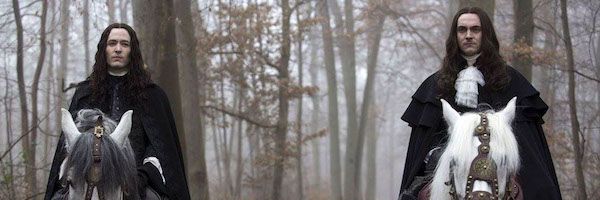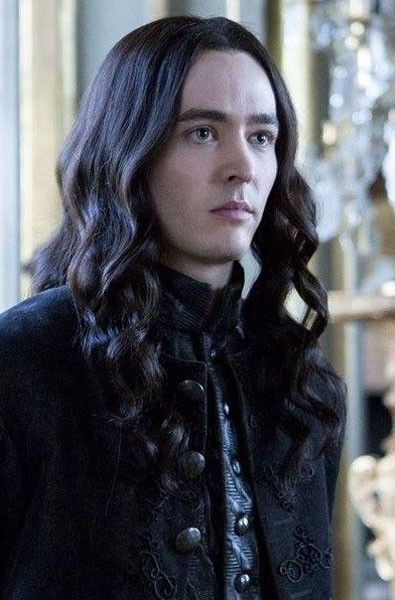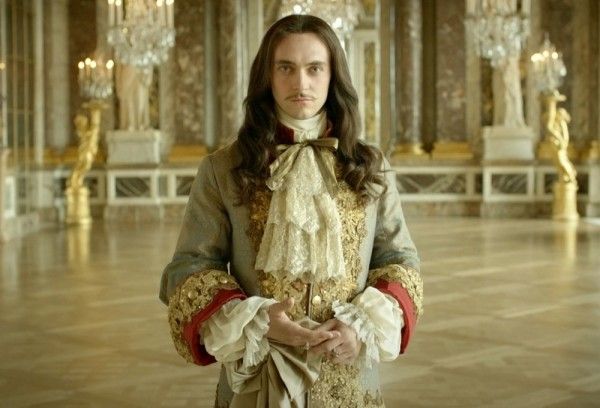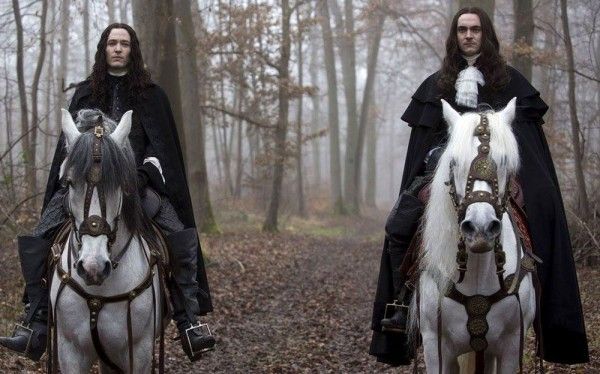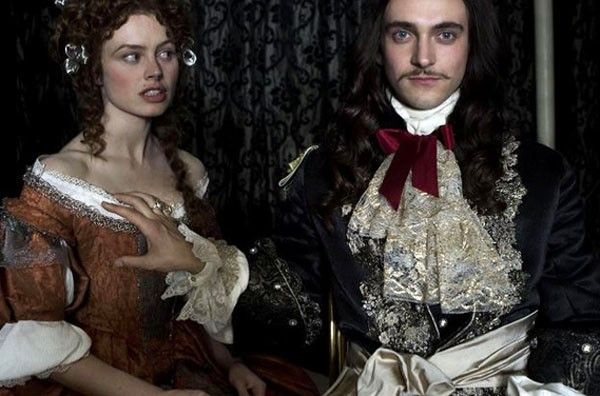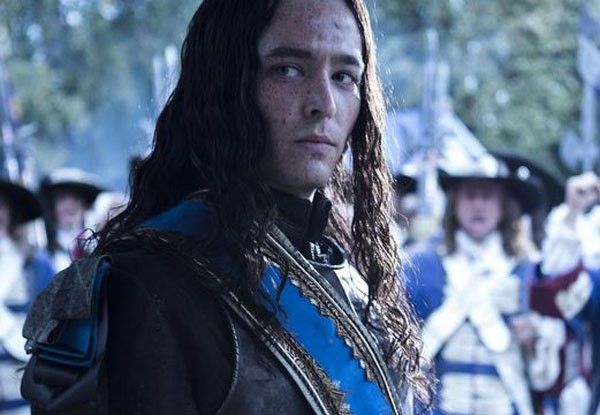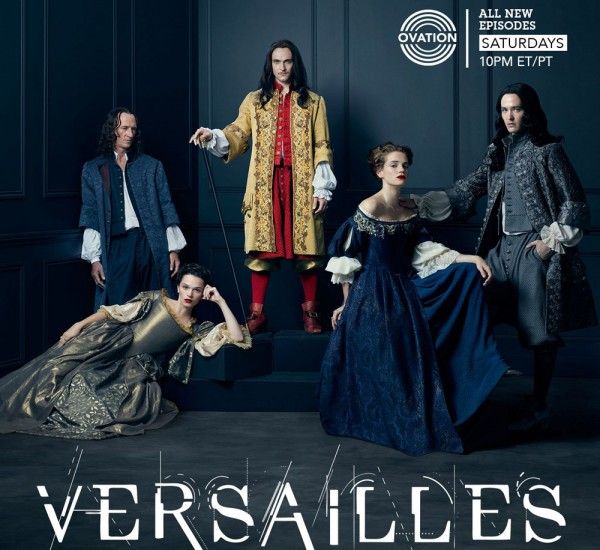Set against a backdrop of power, love, betrayal and war, the acclaimed 10-episode series Versailles is airing in the U.S. for the first time on Ovation TV. Exploring French history in a uniquely modern way, the story is set in 1667, when King Louis XIV (George Blagden) was a 28-year-old monarch and ruthless leader that would stop at nothing to seize absolute control of France and his enemies, all while his flamboyant brother Philippe (Alexander Vlahos) was causing a stir of his own.
During this exclusive interview with Collider, co-stars George Blagden and Alexander Vlahos talked about how they came to this show, never meeting each other before they were both cast, finding the complex brotherly dynamic, playing people who were so powerful, how they view the relationship between their characters, the modern feel of the story, how beautiful the sets and wardrobe are, and what it must have been like to only know life within a kingdom.
Collider: How did this show come about for you?
ALEXANDER VLAHOS: (Show creators) David [Wolstencroft] and Simon [Mirren] had written Episodes 1 and 2, which was built as a two-part pilot, but I was never given the script for that. It was a page and a half of a scene from Episode 2, where Philippe comes in and throws off his shoes in the dress. That was the scene I was given for my audition, and I had no other context for Philippe. So, I put a little bit of eyeliner on my eyes and wore a frilly shirt ‘cause I thought I should give them some sort of idea, and then I completely forgot about it and went to New York. Then, I found out I got this job, and that was three months before we started filming. For [George], it was three weeks before we started filming that he got the job.
GEORGE BLAGDEN: And we’d never met. We never did a screen test together or a chemistry reading. They just trusted their instincts on one tape each. And not just us, the whole cast got the part off of one tape, which is either mad or genius, or maybe both.
VLAHOS: I find that process so fascinating because there is no way, from those tapes, that they would know the extent of which we were able to work as brothers. I guess as casting directors, producers and creators you hope, when you look at these two separate energies on their own, and go, “That will probably work.” But you can’t ever know, in that process, that it will work as well as this did. That magic that happens on set is what elevates shows from being another story to being like, “Wow, those guys are really brothers. I’m enjoying watching this.”
Once you had both signed on, was there a point where you felt you finally got these characters and this relationship, especially with so many different shifts in their dynamic?
VLAHOS: There were shifts between moments within the scenes. It’s so layered and so complex. The relationship is one of the things that pulled me in, immediately. I had my first meeting with David and Simon, after I got the job, in Paris and they said, “The show is called Versailles, but the show should be called The Brothers of Versailles because every heartbeat of this show always comes back to them.” In Episode 1, we set up 12 different story arcs, divided between Philippe and Louis. We were lucky. We both have very different energies as people, as actors and as characters. What that brings to the show is that those three different entities create Philippe and Louis, in their entirety. Our approaches are very different, as actors. What we bring to the show, as people, onto the screen, but that’s just luck and instinct from them. It’s something indescribable that makes the show what it is.
BLAGDEN: We are different, but then true chemistry on screen can only happen, if there’s a shorthand. Even within a week of shooting Season 1, we would go on set and be able to instinctively tell how to be able to make a scene work without much conversation before shooting, and that’s quite rare. We didn’t have to spend a couple of hours, the night before, trying to engineer the scene to make it feel authentic. And in Season 2, I could walk onto the set to do a scene with Alex and be like, “This is going to be great!” It could go in two or three different directions, and each one of them could work because of that.
VLAHOS: The biggest compliment that I could give to George – and I don’t say this about many actors that I work with – is that I had complete and utter trust in him allowing me to do my performance and me allowing him to do his, and there not be a conflict of interest. That moved and gelled, at the same time. Trust can be something that you have to gain, over six months of filming with someone, and not because of their difficulty, but that’s just how they are, as people. But with George, it just worked.
George, what’s it like to play someone who’s so powerful that the people around him will tell him what he wants to hear, just to keep him happy?
BLAGDEN: That whole question of power is fascinating, as an actor. It’s a human trait that, if you try to engineer it, it doesn’t work. When a director might shout to you from video village, “Be more sexy!,” immediately, as soon as you try to be more sexy, you are not sexy. It’s the same with power. As soon as you try to be powerful, you’re not. My job is pretty easy, and I’m sure it’s the same on any TV show where there’s a central role that’s omnipotent. They’re given power by all those around them. It’s been really challenging for me, as an actor, to struggle with being powerful, particularly as it’s something that doesn’t come naturally to me, as a person. But those scenes just would not work, if I didn’t have an incredible cast of 15 people around me, giving me that power.
VLAHOS: When Louis would stand up, we’d have to stand up. When he walks into a room, we part and bow. Philippe tends to break the rules because he’s like, “I’m not going to give him that because he’s my brother,” but that’s a character thing. But that’s what we had to do, and we did that very quickly, from the start. Louis is given a pedestal, and then the power comes easy from that.
But then, Louis also can’t ever really know who’s being real and genuine with him.
BLAGDEN: Yeah, exactly. The guy we see at the start of Season 1 is really paranoid and really fractured in his own head because he’s having to deal with that amount of power at such a young age. Even though people do little things to give him power, you’re still not watching a man who’s got total control of his Court and has a lot of power. Trying to fine tune that dial throughout Season 1 was really tricky. Every relationship is tainted with the fact that he’s King. The element of every conversation you’re having with someone, as that character, they’re having with you just to get close to you for your power. That’s really interesting because you don’t know what the main objective there is. It’s like being some sort of super celebrity today, where you probably become very paranoid. That’s challenging, but I’m having so much fun with it.
How do each of you view the relationship between your characters?
BLAGDEN: It just wouldn’t work, if we didn’t have quite a similar opinion of what their relationship was. What we’re trying to achieve is that love/hate relationship of that constant conflict between being brothers, but where one is in charge and one wants to be in charge. That conflict would form their relationship for the rest of their lives. I don’t think you can really portray that complexity on screen unless you’re both on the same page.
VLAHOS: You have to completely agree on why they’re doing what they’re doing. In Season 1, Philippe would always storm in, shout, and then leave, but it was more of an idea of him having done that, all his life, because he’s always been in the shadow. He gets his little moment by storming in, and then storming back out. We’d always talk about, “Does this feel right?,” and then if we both agreed, than we knew that’s the way it should be. Simon and David have written such three-dimensional characters with so many layers. I’m blessed that Philippe doesn’t have the weight of the country on his shoulders, so he gets to cry, shout, be depressed, be elated, be in love, and be able to visibly show it to everyone because there’s no consequence. But, he is also the second wealthiest man in France. He gets all of the plus points, but with none of the negating qualities. Whereas George has to do something much more nuanced and detailed because crying in front of the Court would be a sign of weakness. What this show tries to do, and I think does successfully, is that when you get to see them as brothers, it’s when they’re behind closed doors. It’s that little moment that’s not documented in a Court book. That moment where Louis gets to be King and Philippe is subservient is the public life. I think Philippe always wins privately, but in public, he never wins. That’s the heartbeat. That’s the crux of the show.
BLAGDEN: The relationship is like a dial. Even at the end of Season 2, that’s still happening. When we kick off Season 1, Philippe is such a fantastic character that the majority of the audience is looking at that relationship and going, “This guy should have been King. I would follow this guy into battle.” You see that relationship behind closed doors and you wonder why it’s the other way around. And then, a couple of episodes in, you go, “That’s why it’s that way.” You’re constantly on one team, and then the other. It’s not a set relationship, and the audience is constantly changing its mind about them, as brothers and as individuals.
Are you surprised at how modern all of this really feels?
VLAHOS: No, I’m not surprised because the intent is to make it as modern as possible, so that we don’t alienate people. We got told a set of rules, when we started filming, for what they would do in Court, what they can do in Court, how your character should stand, and how they should hold a cane. But then, the director of the first two episodes, Jalil [Lespert], wanted to make it rock ‘n’ roll. He said, “We know the rules now, so we can break them. We can put them back in, if we want to, but we can take them away again. Kick your feet up on the table, if you want. It’s their living room.” This might seem like a beautiful palace to us – and that us is the modern audience watching – but it’s just a living room in a house.
BLAGDEN: The fact that Jalil decided to make the opening of our show have that rock ‘n’ roll vibe wasn’t from a desire to put a creative directorial spin on it. I was surprised that this is what happened. If you look through the last three hundred years in history and you compare this period of history with the period of history in Downton Abbey, it became so conservative. Three hundred and fifty years ago, a character like Philippe was the second wealthiest man in the most powerful nation in the world. A character like Philippe would not exist in the world of Downton Abbey. He would be ostracized. The fact that people like Philippe were that powerful and so important, and that people would follow a man like him into battle, it’s amazing how modern that is.
VLAHOS: It is a modern show because of the qualities they posses and the visual things that they do.
And even though Philippe flaunts his sexuality, that’s not the thing that seems to cause the biggest problems for him.
VLAHOS: I think he gets away with it because he’s the brother of the King. It’s incredibly risky and incredibly bold. We might look at the King and think, “He’s got seven mistresses?! That’s a bit bloody much!” But back in that time, it was a God-given right that he could have any women that he wanted because he was anointed by God. We’ve got all of these things that seem so modern, weird and out there, but at the time, it was just a matter of fact and part of the life.
This show is so beautiful and decadent to look at. Does it feel that way on set?
BLAGDEN: All the time. It’s amazing!
VLAHOS: What I do find is that, when people come onto the set, they remind you with their outside eye. Season 1 was about seven months of filming, and Season 2 was about six months. Not in a negative way, but you kind of become a little bit numb to it. You’re there to do a job, so you try to focus on the scene. I had seen George in these beautiful costumes, every day, so it becomes the norm. So, when you get set visitors, they’re the ones that remind you how lucky you are and how beautiful your working environment is.
So, wearing normal clothes must feel a bit weird, after all of that.
VLAHOS: Actually, yes. Half of the crew have never seen me out of my wig and costume. When I’m saying goodbye at the end of my day, and I’m in my jeans and trainers, they’re waving going, “Who is that guy?”
BLAGDEN: At the end of both seasons, I got to the stage where, after wrapping on your shooting day, going home and putting flat shoes on was really odd. We wear heels on set, all day, and I felt a lot more comfortable in heels than not.
VLAHOS: We both got the most amazing calves from it.
If these two men could have their way without all of the kingdom stuff, what do you think they would want?
BLAGDEN: Wow! I don’t know that I’ve ever thought about that. It’s kind of like Prince George and Kate and William’s kids. In theory, they will never, ever know a world without being in the walls of the royal family. William and Harry, even though they feel like very modern royals, that’s still their world. It’s just weird that, at the age of 24 or 25, these guys were arguably the most powerful people in the world, like being President of the United States with their hand on the red button. There’s just no imagining, as far as they’re concerned, of being anywhere other than with their hand over the red button.
VLAHOS: I think if he didn’t have any of the household stuff, it would actually set Philippe free. If anyone is trapped in a gilded cage, it’s Philippe because of his brother’s overpowering brotherly love. If Philippe was in this modern world, or he didn’t have the palace, the King and the consequences, I think he’d be on a boat somewhere, sailing off into the sunset with Chevalier, just because that’s what he truly would want. We both portray these young guys at the height of their power, but we try to portray them as they would be in this world, in this century, but Philippe is the one caught between a rock and a hard place the most.
Versailles airs on Saturday nights on Ovation.

